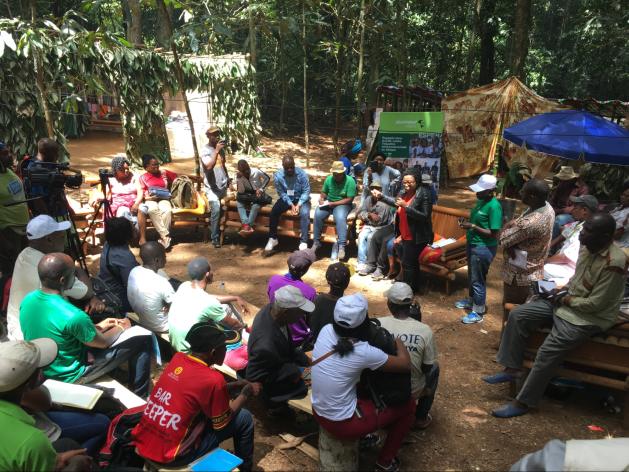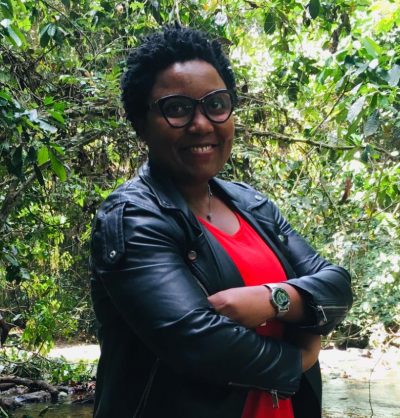Massive Deforestation in the Congo Basin Will Lead to Poverty

YAOUNDÉ, May 13 (IPS) - Sylvie Djacbou Deugoue is Forest Campaigner with Greenpeace Africa and a 2022 Aspen New Voices Fellow.Growing up amid under the leafy canopy of the Congo Basin rainforest, the woodland was more than our home. It was our playground, our medicine cabinet, our teacher, our therapist. And it was a source of livelihood with its rich biodiversity and helped shield us from the effects of climate change.
The mounting tension between economic growth and healthy forest life over years has led to the destruction of some of the world's oldest forests and the resulting poverty of its communities. This massive deforestation has led to the expropriation of indigenous and local communities from their ancestral land without their consent, increased carbon emissions, migration and the disappearance of Indigenous communities' culture and languages.
Rather than developing our country, the changes are impoverishing forest communities and leaving the entire region more vulnerable to climate change and diseases.
The Congo Basin rainforest, larger than the US state of Alaska, refers to six Central African countries (Democratic Republic of Congo, Republic of Congo, Cameroon, Equatorial Guinea, Gabon and Central African Republic) and is the world's second largest tropical rainforest after the Amazon.
Recently, just weeks after International Forest Day on 21st of March, the third part of the Intergovernmental Panel on Climate Change (IPCC) report was released showing us that there is still a lot to do on the ground to limit the effect of climate change. And the Congo Basin forest is one of the frontlines in the fight.
This report once again rang the alarm that, if nothing is done, then the world may find itself on a pathway to climate breakdown and extreme poverty.
Later this year, the annual UN climate conferences (COP 27) will take place in Egypt where the world’s leaders will meet to agree on the 2030 Agenda for Sustainable Development, including its SDG 15 which aims to “protect, restore and promote sustainable use of terrestrial ecosystems, sustainably manage forests, combat desertification, and halt and reverse land degradation and halt biodiversity loss”.
We are expecting more action and fewer false promises from Africa’s leaders and for its youth to take the lead scene in holding their leaders accountable.
As we prepare for this event, it is important to think through how we can use that international platform to drive national governments, especially those from Congo Basin, to act with the same speed they took their pledges to address the climate change crisis.
The current economic development model in Congo Basin is rooted in massive deforestation: more and more concessions are being granted with large scale land set aside for industrial agriculture such as palm oil and rubber.
The loss of the forest ecosystem - and therefore the spiritual and cultural heritage of the community - is irreversible. The tropical rainforests of the Congo Basin are being eliminated.
The impact is not just economic: When forests are cleared, the carbon they store is released back into the atmosphere as carbon dioxide. According to the recent Global Forest Watch data, in 2021, 3.75 million hectares of pristine rainforest (an area critical to carbon storage and biodiversity) was lost at a rate of 10 football fields per minute.
Cameroon, for instance, has lost more than 80 thousand hectares of its primary forests in 2021, almost twice area of the primary forest destroyed in 2019. The Democratic Republic of Congo has lost nearly half a million hectares of primary forest in 2021 (Increase of almost 29% compared to 2020). Only to enrich a small portion of selfish elites.
At this rate, there is no way to reverse forest loss by 2030, as pledged by leaders from 141 countries at last year's COP26 climate summit in Glasgow.
Despite that, Cameroon is still granting a company, like Camvert SA, tax exemptions to implement an almost 60,000 hectares palm plantation project. This will result not only in deforestation but also in biodiversity destruction alongside the loss of communities' livelihoods but also lead communities in the areas in extreme poverty.
One forest community member told me: “Before this company, I was able to collect non timber forest products and sell them. I was also able to find my treatment there when I was ill. Now, there will be no more forest and we are left to ourselves.”

The benefits of these deals, however, do not reach local residents. They are seldom hired when these concessions are developed. My research shows experienced workers in these concessions tend to come from other areas of the country and - even when local community members are hired - they are paid a pittance.
While companies often brag that they are promoting development by opening up roads, it's important to note that these roads are used mainly to deliver timber to the market and are not open for communities.
The Congo Basin countries are not immune: The 2022 World Bank report show the country is a long way away from achieving substantial poverty reduction, with the COVID-19 pandemic keeping people below the poverty line and remaining stubbornly constant.
In DRC, a recent IGF report showed that more than USD 10 million in forest royalties were not paid to the public treasury between 2014 and 2020.
What’s worse, the climate change that this deforestation is making worse will only deepen poverty. The latest IPCC report estimates that in the next decade alone, climate change will drive 32-132 million more people into extreme poverty.
Yes, we need development. But at what cost? And who should that development benefit? Protecting forests is a matter of preserving the livelihoods of the local community and reducing poverty. Granting more forest concessions will not make us richer than we are now.
We need alternative development models that embrace indigenous communities' wellbeing and promote healthy forests. By taking advantage of the indigenous people’s wisdom and knowledge, in forest management there is a possibility to develop while securing communities' land and contribute in bringing back global warming below the critical level (2°C ).
Achieving sustainable development and eradicating poverty in the Congo Basin would involve effectively stopping deforestation and implementing climate policies which ensure social justice and meaningful participation of communities in decision-making.
It is time for the various policy working groups on forest issues in Congo Basin to consider more than their personal economic interests but to take more into consideration the long term need to have healthy forests for healthy life.
© Inter Press Service (2022) — All Rights Reserved. Original source: Inter Press Service
 Global Issues
Global Issues